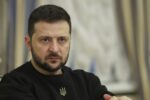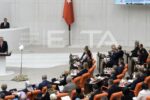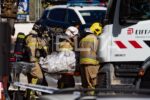Throughout the history the Armenian nationalists have committed bloody crimes, terrorist acts and genocide actions against the Azerbaijani people. A great number of historical documents prove that hundreds of thousands Azerbaijanis were massacred and deported from their own lands in the Caucasus in 1905-1907, 1918-1920, 1948-1953, exposed to ethnic cleansing and genocide on their native historical and ethnic territories by the Armenian chauvinists.
This year is the 20th anniversary of the Armenian aggression against our country. As a result of this policy, 20 percent of the Azerbaijani lands were occupied; over 20 thousand people were killed, more than 50 thousand persons were injured and disabled. Some Azerbaijani servicemen became prisoners of war and civilians were taken hostage. Over one million Azerbaijanis became refugees and IDPs.
Lack of necessary measures to be taken by the USSR leadership, which did not give any political assessment to the demonstrations staged by the Armenians since February 1988, claiming integration of Nagorny Karabakh into Armenia, lead to escalation of the situation in Nagorny Karabakh and surrounding districts, demolition and burning of the villages populated by the Azerbaijanis and massacre of the people in a short period of time. Armenian chauvinists committed slaughters in Karkijahan, Malibayli, Gushchular, Garadaghli and other villages.
The crime committed in Khojaly by the Armenian armed forces together with the 366th motor-rifling regiment of former USSR troops sixteen years ago on the night from 25th to 26th of February was one of the unprecedented events in the history of wars. A lot of heavy military equipment of this regiment, based in Khankandi and including officers of the Armenian nationality, entered the town in three directions, destroyed and burned down the houses. Peaceful civilians forced to leave the town and fleeing to Agdam along the Gargar River, encountered Armenian forces near Nakhchivanik village, where real act of genocide was committed. Children, women, elderly and disabled people were ruthlessly massacred. Perpetrators of the genocide murdered the Khojaly people with unprecedented cruelty, burned them alive, skinned off their skulls and pulled out their eyes. Khojaly tragedy — the genocide committed by Armenian aggressors against the Azerbaijani people put an end to lives of 613 people, including 106 women, 63 children, 70 old people. 487 people were injured, 275 civilians were taken captive, and 150 persons went missing.
As a result of this act of genocide some families were completely exterminated, civilians were killed with unbelievable cruelty, the corpses were mutilated and the captives were subjected to severe torture.
It should be noted that there exists reasonable evidence that 783 out of 4353 Azerbaijani citizens gone missing since the beginning of the conflict are being kept hostage in Armenia and the occupied territories. Azerbaijan subjected to the Armenian aggression suffered great losses and faced problems of identifying fate and location of the persons taken hostage and gone missing during the war. The Armenian side and the separatist regime of Nagorno-Karabakh committing grave breaches of the international law have not yet revealed the location of these persons to the international organizations.
The fact that the violence during the Khojaly events was elaborated in advance and aimed at total or partial destruction of people on the ground of their ethnic origin confirms that these acts constitute the crime of genocide under international and domestic law. This act of vandalism and brutality committed by the Armenian aggressors should be considered at the same level as the tragedies of Khatin and Songmi, and should be assessed as a crime against humanity.
According to the International Law, genocide is defined as an act committed against peace and humanity and considered to be the gravest international crime. The UN General Assembly Resolution 96 (I) of 11 December 1946 reads that genocide, through rejecting the groups’ right to life, degrades human dignity, deprives the mankind of the material and spiritual values created by human beings. Such odious acts are completely contrary to the spirit and aims of the United Nations. United Nations Convention on the Prevention and Punishment of the Crime of Genocide adopted by Resolution 260(III) of the UN General Assembly of 9 December 1948 and which entered into force in 1951 provides legal framework of the crime of genocide. The Contracting Parties confirm that genocide, whether committed in time of peace or in time of war, is a crime under the International Law which they undertake to prevent and to punish.
During the Armenian aggression against Azerbaijan all acts defining the crime of genocide under this Convention were committed. The terrorist policy pursued by this occupant country is carried out for many years before the very eyes of the world community. However under the International Law, and the principles established by the UN and OSCE, inviolability of state borders is to be respected, and violation of the territorial integrity and sovereignty is impermissible. Notwithstanding adoption of four Resolutions of the UN Security Council calling for unconditional liberation of occupied Azerbaijani lands, aggressive Armenia is still unwilling to fulfill these requirements.
Azerbaijani side seeks peaceful resolution of the conflict. The President Heydar Aliyev had taken courageous steps towards settlement of this vital problem of Azerbaijan, explained the main point of Khojali genocide, and in February 1994 Milli Majlis (Parliament) of the Azerbaijan Republic gave legal and political recognition to this event.
In his speeches on the world’s high tribunes, President Ilham Aliyev called upon the international organizations not to remain indifferent to the Armenian aggression against Azerbaijan, and expressed his concern over the double standards applied with respect to this problem by the international community in fight against terrorism. For the first time the country president achieved recognition of Armenia as an aggressive state by the Council of Europe; the fact that Nagorny Karabakh and 7 surrounding districts are under Armenian occupation has been reflected in the official documents of Parliamentary Assembly of Council of Europe.
At present the tragedy of Khojaly is an agenda item for discussion in the Parliaments of several states, a number of international organizations consider Armenia as an occupant state and urge to withdraw forces from the Azerbaijani territories.
As it is known, last year facts have been revealed that prove mass human killings committed with special brutality by the Armenians in March-May 1918 in Guba region. Countless human bones contained in the two pits discovered during excavations on a building site are visual evidence of the Armenian vandalism. It has already been identified that these bones belong to the local civilians brutally murdered by the Armenian armed groups during their assault on Guba city in 1918.
It is vitally important to bring to the attention of the world community the facts about the Guba cemetery revealing the historical events. These facts once again unveil the myth of the “Armenian genocide” and serve as a proof of falsification of the modern history by the Armenians.
Unfortunately, Khojaly genocide characterized with gross violations of human rights has not received legal recognition at the international level yet; no concrete measures have been taken against the terrorist and aggressive acts. It is time to make decisions compliant with the universal values and international legal norms.
Appealing with great hope to the world community and influential international organizations, we believe that the long-term Armenian aggression and mass human rights violations will be put to an end, support will be given for peaceful solution of this painful conflict through negotiations, occupied territories of Azerbaijan will be returned, hundreds of thousands refugees and IDPs will be repatriated to their native lands and their constitutional rights will be restored. We hope that the Armenian terrorists, who have committed aggression against our country and genocide in Khojali, as well as their supporters, will be brought to the criminal responsibility, and that the competent international organizations will impose sanctions on Armenia.
Elmira Suleymanova, Commissioner for Human Rights (Ombudsman) of the Republic of Azerbaijan
The Statement is addressed to the Secretary-General of the United Nations, United Nations High Commissioner for Human Rights, OSCE, Council of Europe, International Ombudsman Institute, European Ombudsman Institute and Association of Asian Ombudsmen, International Peace Bureau, International Peace Federation, embassies of Azerbaijan abroad, as well as the foreign embassies in Azerbaijan, ombudspersons and organizations of Azerbaijani Diaspora.
2010.02.20











